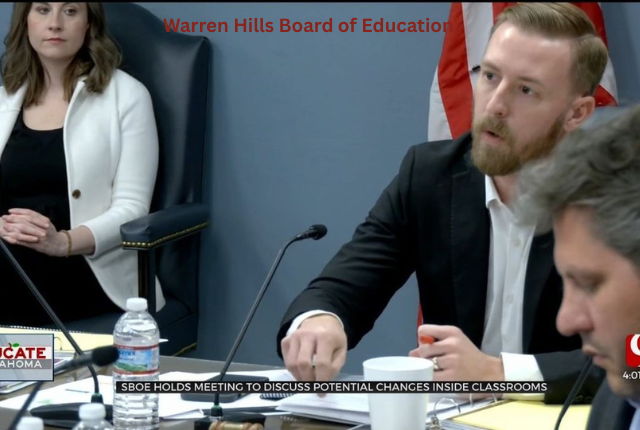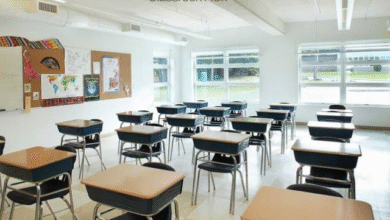Warren Hills Board of Education | Governance & Resources

Education is one foundation of strong communities, and the Warren Hills Board of Education is an integral leader of one of New Jersey’s key regional school systems. The board is responsible for policy making, budget setting, curriculum delivery, and community relations. It is central in shaping the region’s education and community outcomes.
This guide provides in-depth information about the Warren Hills Board of Education’s region, and its relations, actions and impacts on the pupils, teachers, and the region’s community members. It describes the guide’s architecture and objectives for meeting the needs of residents and parents of the pupils, including actionable education and community strategies.
Table of contents
What is the Warren Hills Board of Education?
The Warren Hills Board of Education is a governance system constituted and elected with the responsibility of managing public education within the scope of the Warren Hills Regional School District. They aim to fulfill the strategic direction, policy formulation, budget oversight, and education quality frameworks within the district’s schools, enabling learners to achieve a comprehensive and equitable education.
Elected Officials with a Public Mission
The community and constituents of Warren Hills Board of Education elect the representatives, thus they become the voice of the community. Through elections, Board members are held accountable to the community, which includes the parents, students, educators and taxpayers. Board members are elected for a staggered three-year term and attend the meetings held regularly to decide on pressing matters pertaining to the district.
The duties of a board encompass governance as well as ethical and civic dimensions. They are to safeguard students’ interests and ensure compliance with educational laws while being sensitive to local needs.
Supervision of the Warren Hills Regional School District
The Warren Hills Regional School District is served by the board, which governs the educational institution for the secondary school grades 7 to 12. This caters to both middle school and high school learners during a pivotal period of a child’s development. The board is tasked with the responsibility of confirming the curriculum framework aligns with both state and national standards while supporting the appropriate consideration for post-secondary education, vocational training, or career opportunities.
This model of a regional school district enhances synergies amongst municipalities, improves inter-municipal cooperation, and enhances consistency of instruction throughout the curriculum. Further, it supports prudent fiscal management while upholding rigor and high academic standards.
Serving Multiple Municipalities in Warren County
The district encompasses a wide range of students coming from the following municipalities in Warren County, New Jersey:
- Washington Borough
- Washington Township
- Mansfield Township
- Franklin Township
- Oxford Township
These communities are governed together by a regional board to ensure that educational governance aligns with local aspirations and priorities while providing a shared framework. Typically, each town has a proportional population board, which promotes fair and balanced representation and governance.
This collaborative model proves advantageous for every single student by incorporating the benefits of every municipality, which include shared extracurricular activities, more rigorous courses, and even more advanced teachers and facilities that would not be available in smaller, single-town districts.
Duties of the Board
Enrollment in the Warren Hills Board of Education comes with quite a few responsibilities, particularly in regard to the following functions:
- Establishing academic goals and policies for the district
- Selection of the superintendent and performance assessment
- Budget and expenditure approval
- Oversight of the school safety and infrastructure upgrades
- Community engagement and public feedback meetings
The board also upholds educational governance alongside community engagement, which further consolidates the district’s success.
Key Responsibilities
- District policy development
- Curriculum change approval
- Management of financial resources and the annual budget
- Superintendent hiring and evaluation
- Parent, staff, and community stakeholder engagement
Structure of the Board
The board has nine members who are elected by the community members and serve for three years in staggered terms. Each municipality is proportionally represented to enhance the diversity of viewpoints in the board.
Board Leadership Includes:
- President : Chairs meetings and establishes the overall strategic direction of the organization.
- Vice President : Supports and acts in absence of the President.
- Committee Members: Assigned to focus areas including curriculum, finance, and policy.
Financial Oversight and Budget Planning
The board’s distinct and primary responsibility is to administer the school district’s budget, which is more than $30 million each year. The budget covers the following:
Employee salaries and benefits
Transportation costs
Facility improvements
Technology integration
Special education services
Budget Development Process
- Initial budget development by administration
- Public forums and stakeholder input
- Final approval and submission to the Department of Education New Jersey
The board aims to optimize the education taxpayer money is spent on by directly improving student outcomes.
Academic Accomplishments and Curriculum Management
Ensuring students receive a future-ready education grounded in rigor and academic quality is a foremost priority. The board collaborates with teachers and district leaders to:
- Integrate curriculum with New Jersey Student Learning Standards (NJSLS)
- Grow STEM, CTE, and arts programs
- Facilitate Advanced Placement (AP) and dual enrollment courses
- Oversee programs for students with special needs and the exceptionally able
Recent Highlights to the Curriculum:
- Including digital literacy and financial education courses
- Enhanced career and technical education pathways
- Social-emotional learning and mental health awareness initiatives
Community Involvement and Building Trust Through Transparency
The Warren Hills Board of Education fosters community involvement as a means to build trust and inclusion.
Engagement Opportunities:
- Join and participate in the public monthly board meetings (agenda and minutes are posted online)
- Leave public comments and concerns through the district website
- Join advisory groups or volunteer in schools
- Participate in board elections
Transparency Tools:
- Online board portals with meeting dates, agendas, and documentation
- Publicly available budget reports and audits
- Dashboards on school performance and accountability
- Strategic Plans and Recent Initiatives
Strategic Goals for the Education District
The board is constantly adapting and re-evaluating goals to sustain education-defined success over time.
- Student Achievement: Focus on improving test scores, graduation rates, and post-secondary educational preparedness.
- Equity and Access: Strive to guarantee all students, regardless of their background, the opportunity to participate fully.
- Technology Integration: Introduce smart classrooms alongside 1:1 device schemes.
- Infrastructure Modernization: Renew learning facilities, including buildings, HVAC systems, and learning spaces.
Most Important Accomplishments:
- A 1:1 Chromebook program was successfully initiated.
- The district wellness program supporting mental health was launched.
- Enhanced protocols for visitor safety and management systems were implemented.
Voting and Elections
The board elections happen within the November general elections, allowing community members to actively participate in school governance.
Eligibility Criteria:
- Must be a U.S. citizen, 18 years of age or older, and a resident of the district.
- Must not be prohibited by criminal charges.
- Need to meet the nomination petition and the deadline set in law.
What Is the Importance of This:
Participation in board elections actively engages residents in the administration of the school, ensuring their community values are integrated within local educational decisions, including budget allocation, curriculum, and policy formulation.
Advantages of an Involved Board of Education
An empowered and visionary board brings about:
- Achievement of academic goals
- Improvement of safety in school
- Strengthened relations between the school and the community
- Public funds are used more effectively
Concrete Suggestions for Residents and Parents
- To receive the most recent news, subscribe to the district newsletter.
- To get the most recent announcements, follow the district on social media.
- To stay connected, volunteer at events or become a PTO member.
- To express concerns or share suggestions, contact board members directly.
- To work in synergy with the district, read the strategic plan.
Conclusion
The Warren Hills Board of Education serves not only as a regulatory body but also actively shapes the educational experience of countless students, illustrating the board’s commitment to the community. The board’s exemplary financial management, educational leadership, and active involvement in community relations demonstrate the building blocks of good governance: collaboration, transparency, and accountability.
FAQS
1) What does the Warren Hills Board of Education actually do?
The Warren Hills Board of Education sets policy, approves curriculum changes, hires and evaluates the superintendent, and oversees an annual budget of more than $30 million. It ensures legal compliance, fiscal responsibility, and high academic standards across grades 7–12 in the regional district.
2) How can parents and residents engage with the board?
Attend the board’s monthly public meetings, submit comments through the district’s website, volunteer on advisory committees, and vote in the November elections. Agendas, minutes, budgets, and audit reports are posted online to promote transparency and accountability.
3) Which communities does the district serve—and why does the regional model matter?
The district serves Washington Borough, Washington Township, Mansfield Township, Franklin Township, and Oxford Township. The regional structure enables shared resources, consistent curriculum, stronger extracurricular options, and cost-efficient governance, delivering equitable opportunities to all students in grades 7–12.





